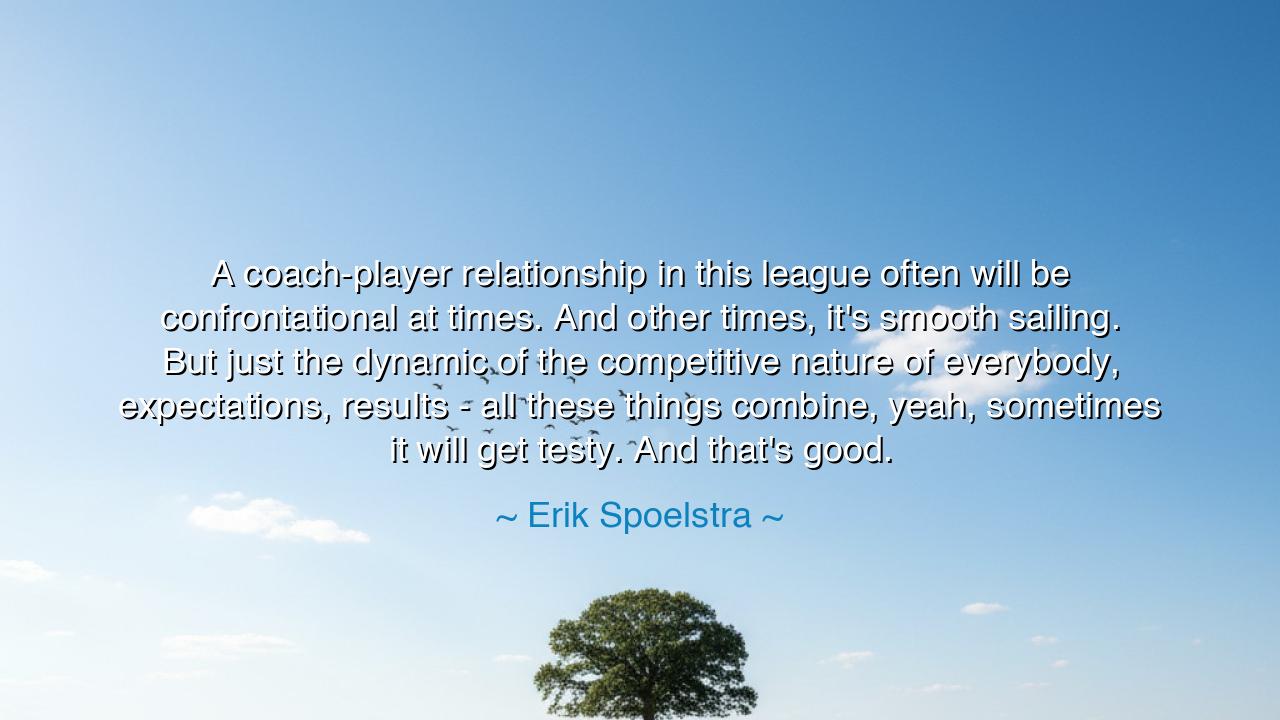
A coach-player relationship in this league often will be
A coach-player relationship in this league often will be confrontational at times. And other times, it's smooth sailing. But just the dynamic of the competitive nature of everybody, expectations, results - all these things combine, yeah, sometimes it will get testy. And that's good.






The words of Erik Spoelstra, “A coach-player relationship in this league often will be confrontational at times. And other times, it’s smooth sailing. But just the dynamic of the competitive nature of everybody, expectations, results—all these things combine, yeah, sometimes it will get testy. And that’s good,” reveal the rhythm of struggle and harmony that marks all great endeavors. He speaks of the fiery bond between leader and disciple, where conflict and unity are not enemies, but companions on the path to greatness.
The coach-player relationship is like iron striking iron. At times, sparks fly — born of pride, ambition, and the hunger to win. This confrontational energy, though sharp, forges strength. Without it, growth would wither, for challenge refines the soul as fire refines gold. And yet, there are moments of peace, of smooth sailing, when trust flows like calm waters, and both stand as one in purpose.
The dynamic of this bond is woven from the fabric of the competitive nature itself. In the heat of striving, expectations weigh heavily, and results become the measure of worth. It is natural, then, that tempers flare and voices rise, for such is the cost of pursuing excellence. But Spoelstra declares that this very tension is not a curse, but a gift.
Thus, his words teach that greatness is not born in silence or ease, but in the balance of friction and unity. A testy moment is the sign of passion, proof that both sides care deeply for the outcome. To future generations, let this truth be passed down: harmony is sweet, but struggle is sacred, for together they shape champions and carve triumph from the raw stone of competition.






NLng linh
Erik Spoelstra’s view on the confrontational nature of coach-player relationships in sports resonates with me. It's true that competition and high expectations often lead to conflict, but as he says, that’s not necessarily a bad thing. But do you think all players are equipped to handle this kind of dynamic? How do different personalities affect how players respond to confrontations or high-pressure situations in a team environment?
TVVU NGOC TUONG VY
Spoelstra’s quote makes me think about how confrontation can be both a tool for growth and a potential source of stress. In professional sports, where the pressure is immense, is it inevitable that there will be friction? Does this tension ultimately drive success, or is there a point where it becomes detrimental to the team dynamic? I’m curious how other coaches and players view this balance between confrontation and cooperation.
KLPhan Khanh Linh
Erik Spoelstra’s approach to confrontation in the coach-player relationship is refreshing. He seems to embrace the challenges that come with competition and sees them as a natural part of the process. But I wonder, how do players respond to this confrontational environment? Does it motivate them, or does it cause stress? It's a fine line between healthy challenge and overwhelming pressure, don’t you think?
Qqaz123
I love how Erik Spoelstra acknowledges the ups and downs of the coach-player relationship. The competitiveness and high expectations that come with professional sports can create friction, but he sees it as an opportunity. But does this ‘testy’ dynamic always translate to better results, or can it sometimes create lasting tension? How do you think athletes and coaches can balance that competitive intensity with a more harmonious relationship?
THHo thi thuy hang
Erik Spoelstra’s quote highlights the tension that can exist in competitive environments, especially in sports. It's interesting how he frames the confrontation as a positive thing. Do you think that healthy conflict in a coach-player relationship is necessary for growth, or can it sometimes be counterproductive? It’s easy to think of confrontation as a negative, but it sounds like Spoelstra believes it plays a role in pushing each other to higher performance.